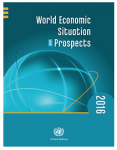Global economic growth is estimated at 2.4% in 2015 as a result of “cyclical and structural headwinds,” according to the UN World Economic Situation and Prospects (WESP) 2016.
The report also finds positive trends in environmental sustainability, suggesting that the world may have begun to delink economic growth from carbon emissions growth.
 10 December 2015: Global economic growth is estimated at 2.4% in 2015 as a result of “cyclical and structural headwinds,” according to the UN World Economic Situation and Prospects (WESP) 2016. The report also finds positive trends in environmental sustainability, suggesting that the world may have begun to delink economic growth from carbon emissions growth.
10 December 2015: Global economic growth is estimated at 2.4% in 2015 as a result of “cyclical and structural headwinds,” according to the UN World Economic Situation and Prospects (WESP) 2016. The report also finds positive trends in environmental sustainability, suggesting that the world may have begun to delink economic growth from carbon emissions growth.
WESP predicts the global economy will grow 2.9% in 2016 and 3.2% in 2017, with a shift towards growth in developed economies. The report identifies five major “headwinds,” or factors expected to limit growth: persistent macroeconomic uncertainties; low commodity prices and diminished trade flows; increasing volatility in exchange rates and capital flows; stagnant investment and productivity growth; and continued disconnect between finance and real sector activities.
Energy-related carbon emissions did not increase in 2014, the first time in 20 years except in 2009 during the global economic contraction, according to the WESP. The report predicts that the expected “continuing expansion of the service sector and the declining growth of investment in the context of structural transformation should further weaken the link between economic growth and carbon emissions.” The WESP cautions that the data does not imply that countries will automatically experience a decrease in per capita emissions after achieving certain income levels, but that a number of factors will determine emissions trajectories, including mitigation policies, energy prices, and economic structural transformation.
The report cautions that slowing economic growth in many developing countries may constrain progress in poverty reduction in the near-term, as well as “derail long-term sustainable development.” It further highlights concerns related to persistent unemployment and the potential to realize Sustainable Development Goal (SDG) 8 on employment and decent work for all. The report recommends policy interventions that address inequality, such as stronger social safety nets and investments in education, health and infrastructure.
Also needed are stronger and more coordinated policy efforts to ensure “robust, inclusive and sustainable economic growth, which will be a key determinant for achieving the 2030 SDGs,” according to Lenni Montiel, UN Department of Economic and Social Affairs (DESA).
DESA released the first chapter of the report on 10 December 2015, and will launch the full report in January 2016. [UN Press Release] [DESA Press Release] [Publication: World Economic Situation and Prospects 2016: Global Economic Outlook (Chapter 1)]